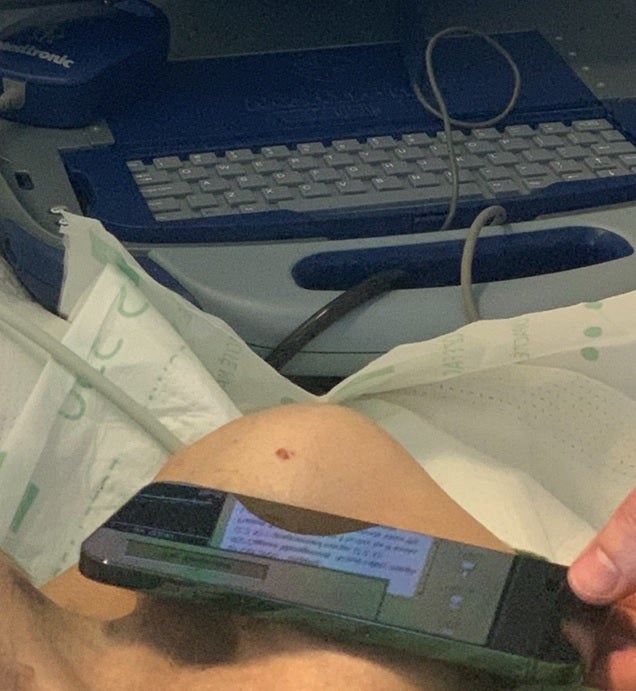AHA Warning: MagSafe can stop your implantable cardiac device from working

If you wear a pacemaker and own an Apple iPhone 12 series phone, the American Heart Association (AHA) has some important news for you. The Journal of the American Heart Association has reached the same conclusion as the Heart Rhythm Journal did when it announced back in January that "Medical devices such as implanted pacemakers and defibrillators might contain sensors that respond to magnets and radios when in close contact."
MagSafe on the iPhone 12 line can stop your implanted cardiac device from working as it should
The iPhone 12 line contains a magnet inside the handsets that is used for the MagSafe accessories like power adapters, cases, wallets and more. These stick to the back of the phone through the use of powerful magnets. MagSafe is expected to return for the iPhone 13 series and there has been speculation that Apple plans on equipping the line with more powerful magnets although it is unknown whether the new report will lead to any changes.

Tests reveal that the MagSafe magnets on the iPhone 12 series could negatively impact your pacemaker
The Heart Rhythm Journal published a study earlier this year about a pacemaker built by Medtronic that shutdown when an iPhone 12 series phone was held near the surgically implanted medical device. To prevent such a dangerous shutdown from taking place, the publication said to "keep your iPhone and MagSafe accessories a safe distance away from your device more than 6 inches /15 cm apart or more than 12 inches/30 cm apart if wirelessly charging. The new report from the AHA says that these undesired effects are only possible when an iPhone 12 series handset is turned on or very close to the implanted device.
While the AHA used an iPhone 12 Pro Max for its testing, it did note that "select devices from all three major device companies were found to have magnetic susceptibility." We assume that Samsung and Apple would be two of the major companies involved in testing, but the Journal report does not mention the three by name outside of the iPhone 12 Pro Max that was tested. 11 different pacemaker and implantable cardioverter-defibrillator (ICD) devices were tested with the current top-of-the-line iPhone model.
Of the 11 devices tested with the iPhone 12 Pro Max, some were already implanted in patients (known as in vivo testing) while other were ex vivo which means that the devices were still inside the original packaging. The AHA Journal notes that "Our study demonstrates that magnet reversion mode may be triggered when the iPhone 12 Pro Max is placed directly on the skin over an implantable cardiac device and thus has the potential to inhibit lifesaving therapies."
The report says that people often place their smartphones in their breast pocket which can "lead to asynchronous pacing or disabling of anti‐tachycardic therapies." Other devices that also contain magnets that need to be watched closely include "smart tablets, E‐cigarettes, fitness watch wristbands, and wireless headphones." The AHA does say that the sample size of its testing was small and limited to select devices. As a result, it suggests that a large-scale study be performed to confirm the results.
You might want to speak to your Doctor about using MagSafe with your pacemaker
The American Heart Association's conclusion says "that although the Food and Drug Administration website states that cellphones do not pose a significant health risk for patients with these devices, they do acknowledge that certain precautions may be advisable. Based on the variability of interactions with respect to different smartphone models, patients are advised to consult with a heart rhythm specialist regarding recommendations specific to their smartphone and cardiovascular implantable electronic devices (CIED).
The testing done by the AHA and published in the Journal reveals that of two implantable cardioverter defibrillators studied inside patients' bodies, both the Medtronic Amplia MRI Quad CRTD and the Abbott Medical 1231‐40 Fortify VR suffered interference from the iPhone 12 Pro Max that prevented them from working perfectly. One pacemaker tested, the Boston Scientific V273 Intua CRT‐P, also had issues when in close contact with the same handset.
Of the devices tested inside the packaging, three out of five implantable cardioverter defibrillators were impacted by the iPhone 12 Pro Max. Among six pacemakers tested while still in the box, five out of six units were negatively affected by the phone.
Follow us on Google News













Things that are NOT allowed:
To help keep our community safe and free from spam, we apply temporary limits to newly created accounts: